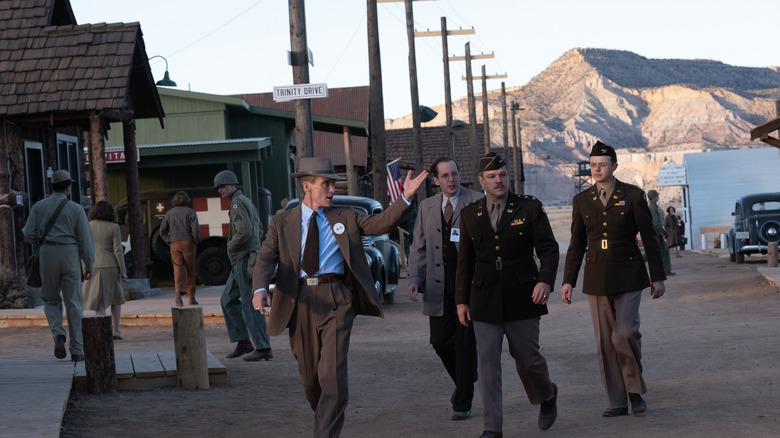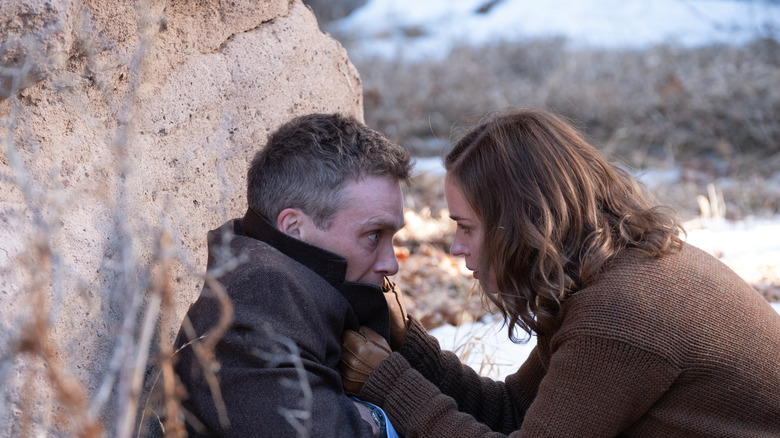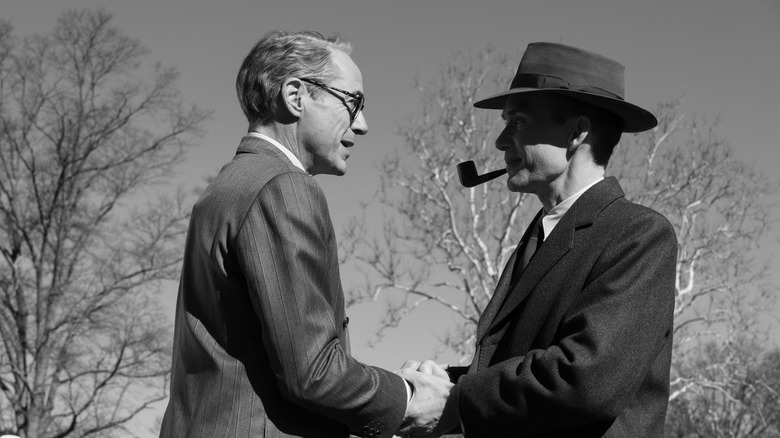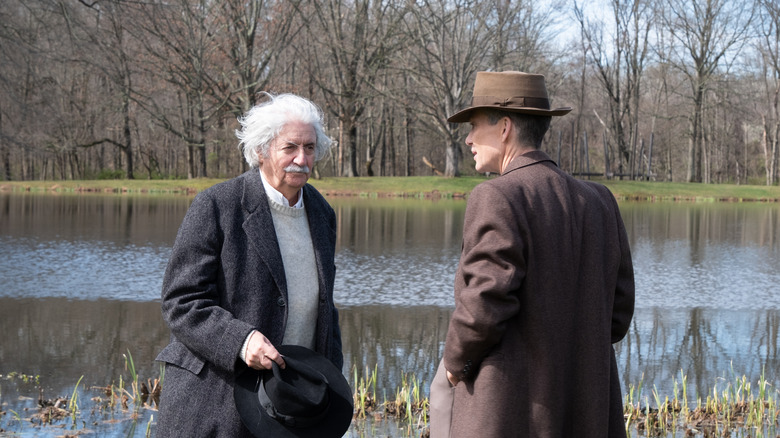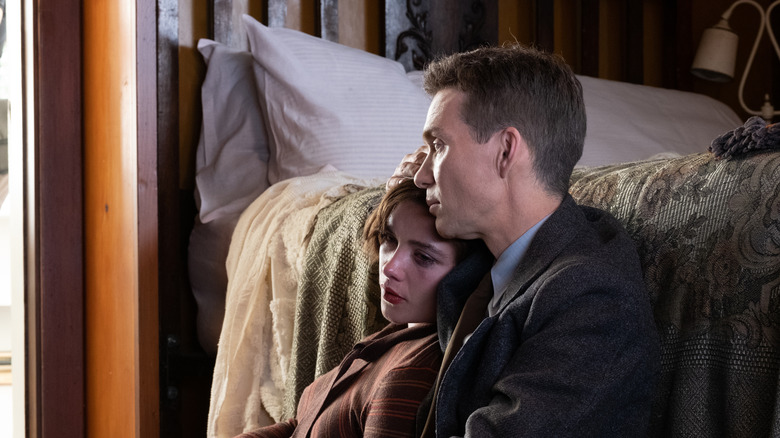Oppenheimer Spoiler Review: A Brilliant, Horrifying, Paradoxical Biopic
This piece was written during the 2023 WGA and SAG-AFTRA strikes. Without the labor of the writers and actors currently on strike, the movie being discussed here wouldn't exist.
"It's a paradox, but it works." This one brief sentence gets at the heart of the new Christopher Nolan film "Oppenheimer," serving as a potentially accidental kind of mission statement. A movie about the life and times of J. Robert Oppenheimer, the scientist who led the Manhattan Project during the latter years of World War II and who essentially invented a new form of warfare via the atomic bomb, is not impossible but presents a series of challenges to any filmmaker. Here is a man whose intellect was unparalleled, who rubbed shoulders with many of the most remarkable scientists to ever live, and whose importance to both American and world history is unquestioned. But here is a man whose intellect led to the death of countless thousands of innocent people in service of concluding a world war, and whose intellect then inspired other people across the world to pursue more violent means of warfare.
The paradox of "Oppenheimer" is that the man deserves a full accounting, but that full accounting does not flatter him or those around him; that the three-hour epic is populated by what feels like three-quarters of Hollywood with many actors appearing just for a handful of minutes; that in many ways, the film is centered around the Trinity Test, in which the atomic bomb was first successfully tested in the deserts of New Mexico, but is otherwise an intimate story in which different groups of men debate things in different locations, all presented in crystal-clear IMAX photography. But, to quote Oppenheimer, it works.
In spite of the fact that Nolan (serving also as sole screenwriter, working off the Pulitzer Prize-winning biography "American Prometheus") is dealing with only real-life characters and events for the first time in his career, he still manages to fiddle around with timelines, helping ensure that "Oppenheimer" is never less than propulsive, intellectual, and jittery in its pacing. There are two separate title cards (for the scientific properties of fission and fusion) that appear early in the film, meant to delineate one thread in which Oppenheimer (Cillian Murphy) is brought before a faux-prosecutorial board of men curious to revoke his security clearances in 1954, and another in which politician Lewis Strauss (Robert Downey, Jr.) goes through a contentious Cabinet confirmation process in 1959. But there's a third, slightly more straightforward thread throughout, in which we follow Oppenheimer for nearly two decades, from his college days at Cambridge leading up to the fateful morning in mid-July 1945 when the A-bomb was tested in the dark of night.
History as thriller
Headline aside, it's not really a spoiler to talk about American history, especially history of such gravity. It's to Christopher Nolan's credit that he's able to treat a couple of different aspects of the post-WWII downfall of J. Robert Oppenheimer as surprises akin to something in a suspense thriller, both regarding someone in the shadows coming out to speak against a key figure in a public manner. The 1954 hearing against Oppenheimer — which resulted in him losing his security clearance, and helped contribute to his falling out of the public spotlight after being celebrated across America for years as "the father of the atomic bomb" — hinges on a letter written to J. Edgar Hoover by William Borden (David Dastmalchian, 15 years removed from his feature debut role in "The Dark Knight") that calls out Oppenheimer for his left-wing political leanings and his connections to more strident Communists among the scientific community and in his personal life.
For most of the three-hour running time, it's technically an open question for a Senate aide (Alden Ehrenreich) to wonder who in the Atomic Energy Commission gave Borden the classified material to help accuse Oppenheimer. The eventual revelation that Strauss worked with a sour military man (Dane DeHaan) to give Borden the files feels less surprising than perhaps expected, if only because of how effectively Downey, Jr. captures in his performance the frustration and moral impotence he feels between himself and Oppenheimer, a man who he admires but is humiliated by in countless situations. The twist that does work more effectively occurs in Strauss' Senate hearing, as he attempts to win a place in President Eisenhower's Cabinet as Secretary of Commerce. Much hinges on the testimony of a scientist named David Hill, who we see only very briefly and silently earlier in the film. But since Oscar winner Rami Malek plays Hill, it's no surprise that he has a crucial moment in offering his testimony at the hearing, quickly making clear that he's essentially representing any and all scientists horrified by how the American government treated Oppenheimer after World War II, and accurately accuses Strauss of having spearheaded the attempt to discredit the eponymous scientist.
Haunted by visions
For any criticisms levied against Christopher Nolan in his career about being too cold or calculated as a filmmaker, there's a strong and intense undercurrent of emotion bubbling under the surface throughout every scene. The sequences featuring Downey, Jr. (those filmed from his perspective, both during the Cabinet hearing and in any flashbacks emanating from his remarks, are in black-and-white, a first for IMAX photography) are rife with jealousy, as Strauss desperately tries to be accepted by a scientific community that instantly understands his mental limitations and treats him as second-rate. Of the many recurrent images in the film, one that stands out and serves as the kicker for the story is that of Strauss watching from afar as Oppenheimer speaks with the legendary Albert Einstein (Tom Conti) on the Princeton campus, before Strauss tries and fails to make polite conversation with Einstein, leading the politician to assume the two scientists were speaking derisively about him. And Oppenheimer himself is both charismatic and tightly wound; from the start, when we see him as a young man, it seems clear that for all his remarkable intelligence, this is a man barely holding himself together and frequently coming apart at the seams.
When we think of films shot in IMAX — not just the ones presented on the towering screens — we think of action spectacles, such as Nolan's "The Dark Knight" or Tom Cruise scaling the Burj Khalifa in "Mission: Impossible – Ghost Protocol." But "Oppenheimer," though it does feature some jaw-dropping imagery meant to depict the visions of quantum mechanics and physics rattling around Oppenheimer's psyche (he dubs it being plagued by visions) before leading up to the Trinity Test, is largely focused on the man himself, both emotionally and literally. Nolan and cinematographer Hoyte van Hoytema shot this in a mix of IMAX and 65mm film (and if you are lucky enough to live near one of the 30-plus theaters in the United States presenting the film in IMAX and 70mm, you must run to get tickets if you haven't already procured them), and so much of what's presented are close-ups of actors' faces.
As much as Christopher Nolan is known for his ability to conjure up spectacle (like one of the magicians from his adaptation of "The Prestige"), he's an excellent director of actors, and the proof is in the six-story images littered throughout "Oppenheimer." Murphy, whose collaborations with Nolan extend to "Batman Begins" when he played the Scarecrow, is the obvious standout, doing so much with a man who managed to be both charming enough to win over the might of the American military and government as well as scientists across the world, while also repressing the very real guilt and trauma he felt at inflicting death and destruction upon society. The use of close-ups on Nolan's part, and the tautly expressive emotions running rampant on Murphy's face recall the silent-film masterpiece "The Passion of Joan of Arc" in which Renee Jeanne Falconetti delivered a masterful performance for the ages through her pained visage. "Oppenheimer" is not a silent film, and Nolan gives his leading man plenty of dialogue to work through, but it's in Murphy's cutting blue eyes and his tightly wound face that so much emotion bleeds through.
With a cast also including (deep breath) Emily Blunt, Downey, Jr., Matt Damon, Malek, Matthew Modine, Benny Safdie, David Krumholtz, Ehrenreich, Florence Pugh, Josh Hartnett, Kenneth Branagh, and Casey Affleck (and many, many more), "Oppenheimer" is as impressively acted beyond the title role, with all actors making such powerful impacts that it's almost unfortunate how so many of them only make brief appearances. But that's the nature of the time-jumping, globe-trotting story.
A fatal humiliation
Of course, the central moment of "Oppenheimer," its true climax, is the depiction of the Trinity Test. Again, since history is history, it should not come as a surprise to anyone that the test works, because the A-bomb would quickly be dropped on Hiroshima and Nagasaki, swiftly bringing an end to World War II in August 1945. Much of the hour or so preceding the test has touches and inspirations from Paul Thomas Anderson's "There Will Be Blood," as Oppenheimer re-embraces his scientist status after briefly donning a military uniform, setting up an old-fashioned town in the middle of Los Alamos, New Mexico, and all in the hopes of effectively creating an atomic bomb that brings together his theories of quantum physics. The nighttime sequence building up to the Trinity Test, with Oppenheimer nervy and edgy as the rest of the scientists as well as his military keeper (Damon), is remarkably tense in spite of the fact that (as noted above) the test clearly works. Perhaps part of the tension derives from the knowledge many viewers have: that Christopher Nolan, priding himself on eschewing CGI when possible, has stated that his film's replication of the Trinity explosion was accomplished with practical effects.
And though "Oppenheimer" is not an action film, Nolan is one of the finest filmmakers working today who can effectively and clearly create awesome and terrifying action-based imagery. The Trinity Test is no exception; he, van Hoytema, editor Jennifer Lame, and the entire production team have pulled off something here both weirdly beautiful and definitively horrific. That the test works is a validation of Oppenheimer's theories, and of his scientists' man-hours of work over multiple years and multiple billions of dollars. But it also represents — as noted to Oppenheimer by Niels Bohr (Branagh) — a new world, not just a new weapon. Oppenheimer, as intelligent as he is, is also hopelessly idealistic, presuming that by using the A-bomb, America would not only show off its power to the world, but ensure a longer world peace because of it. So when he approaches President Harry Truman (Gary Oldman) to share the concern that he has blood on his hands, he's gobsmacked by Truman noting (harshly but in some way correctly) that the Japanese care less about the man who made the bomb than the man (and thus, the country) dropping the bomb.
The ensuing horror Oppenheimer feels (along with the twin revelations of how William Borden got his hands on classified materials, and how Lewis Strauss will fail to get a Cabinet post) culminates in the film's final scene. As Nolan hops around in time throughout the swift three hours of "Oppenheimer," he keeps coming back to the image in Strauss' mind of how Einstein seemingly snubbed him after a brief conversation with our title character. But as Ehrenreich's Senate aide notes, it's always possible that they weren't talking about Strauss at all but "something more important." And aside from being a snide dig, we learn in the end that the aide is right. In the final scene, we get the objective truth of what happened in that side discussion, as Oppenheimer reminisces with Einstein about how the latter reviewed the former's calculations of what would lead to the A-bomb. Einstein noted in that earlier conversation that Oppenheimer could end up destroying the world if he wasn't careful, referencing a possibility that a single A-bomb explosion would lead to a catastrophic chain reaction of never-ending detonation and the world going up in smoke in an instant. Literally, that never happened. But metaphorically, "I believe we did," Oppenheimer intones quietly.
A devastating masterpiece
As devastating as "Oppenheimer" is, and as much as the final moments of the film visualize the terror in the man's mind at the notion of having destroyed the world (recalling the line from the Bhagavad Gita, "I am become Death, destroyer of worlds" that Oppenheimer used to refer to himself in real life), it avoids being overly didactic or polemical. There's little doubt that Nolan is not treating this man as a savior — perhaps the most disturbing scene of the film comes after the Trinity Test, as Oppenheimer gives a speech meant to rouse a crowd cheering on the end of WWII due to the A-bomb (thus cheering on the death of thousands), but envisions the crowd engulfed by the same bomb, with charred bodies and flapping skin — but he's treating the man with depth and honesty.
Christopher Nolan has made variations on the themes inherent in "Oppenheimer" before, from men rent asunder by warring internal motivations to the horrendous and awe-inspiring power the human mind can wield. But this film feels like an apotheosis for so much of the career leading up to this moment. As befitting its ideal presentation, this is a big, mammoth movie, boasting a career-best performance from Cillian Murphy, a whip-smart script, and other technical marvels. (Jennifer Lame's editing is particularly remarkable, ensuring smooth transitions from timeline to timeline, and sometimes from aspect ratio to aspect ratio.) "Oppenheimer" arrived with huge expectations, and has turned out to be a glimpse into American history that speaks with gravity and weight. This is one of the best films of the year.
